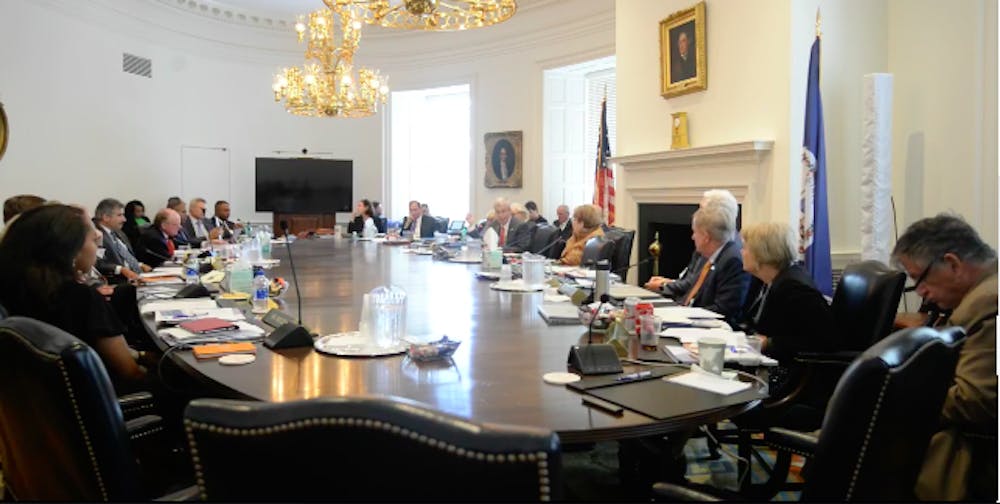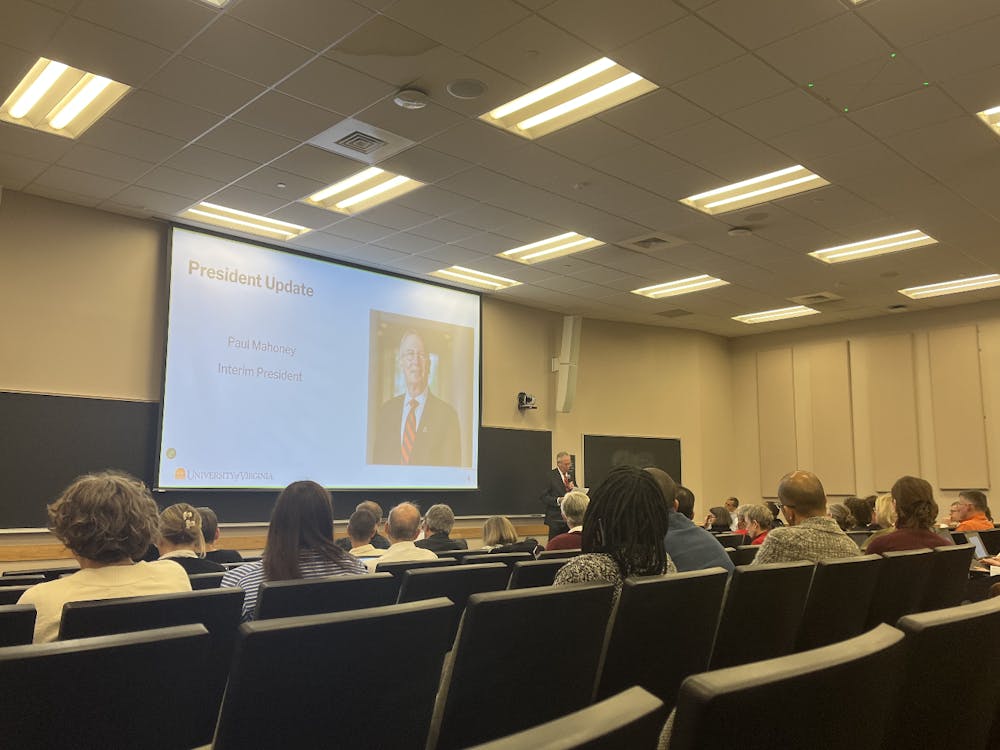The University Board of Visitors Finance Committee will be asked to approve tuition increases for the 2018-19 academic year at its meeting this Thursday. According to agenda materials outlining proposed increases in undergraduate tuition rates, the Board will consider an average increase of of 3.3 percent for in-state students and 3.9 percent for out-of-state students.
All returning undergraduates in all schools will see their annual tuition rates rise by 2.5 percent — $308 to $436 — dependent on the school, while tuition for returning out-of-state undergraduates in all schools will increase by 3.5 percent — $1,530 to $1,712 — again dependent on the school. Entering undergraduates in the College and Curry School will see their rates rise by the same amount.
Unlike tuition rates for the College and Curry School, incoming in-state students studying in the Architecture, Nursing, Commerce, Engineering and Batten Schools will see a higher percentage increase in their tuition than incoming out-of-state students.
Annual tuition rates for entering undergraduates in the School of Architecture are proposed to increase by $1,334, or 10 percent, while the rate for out-of-state will increase by $2,530, or 5.9 percent. However, a $500 fee will be eliminated for these students, which will result in a net increase of 6.2 percent and 4.7 percent for in-state and out-of-state entering students respectively.
Annual tuition rates for entering in-state students in the School of Nursing are proposed to increase by $2,334, or 17.5 percent. Tuition for incoming out-of-state students will increase by $3,530, or 8.2 percent.
Tuition for incoming Engineering undergraduates is proposed to increase by $1,436, or 8.2 percent, while the rate for out-of-state will increase by $2,674, or 5.7 percent.
Annual tuition rates for entering third-year in-state undergraduates in the Batten School are proposed to increase by $2,128 or 11.5 percent. The out-of-state rate students will increase by $3,378 or 7 percent.
Annual tuition rates for entering third-year in-state students in the McIntire School are proposed to increase by $2,962 or 16 percent. The rate for out-of-state students will increase by $4,212 or 8.7 percent.
Most of the University’s graduate and professional schools are proposing a tuition and fee increase ranging from 3 percent to 6 percent for in-state students and 2 percent to 6 percent for out-of-state.
The Board will also vote on a $110 increase in the mandatory comprehensive fee, which is paid by all regular session students.
The majority of the fee will address increased needs in student health such as general medicine, counseling and psychological services and accessibility needs. A small amount — $5 — will be used for planned compensation increases for employees and operational needs in the University Transit Service, Newcomb Hall and Student Health, and $4 will go towards providing more arts offerings for students.
At the last Student Senate meeting of the year on Nov. 29, several students spoke out against the tuition increases and questioned Melody Bianchetto, the University’s vice president for finance, about the tuition hikes.
During the meeting, Wes Gobar, a fourth-year College student and Black Student Alliance president, asked how the University would incentivize students of color to apply in light of the events of Aug. 11 and 12 and the added tuition hikes.
“I just really wanted to speak for a little bit on the urgency of this,” Gobar said. “I know the University is currently seeing a decline in applications from African-Americans.”
He said he felt the long-term effects, too, could be damaging to the University’s prestige and academic excellence.
“I’m most worried the profile of our school will change, our school will be less socioeconomically diverse,” Gobar said. “It weakens our standing as a public university.”
In an interview with The Cavalier Daily last Friday, University President Teresa Sullivan addressed the tuition hikes and said the proposed rates fall in line with the University’s goals of low tuition.
“For the overall tuition increase, it falls in line with our intention to try and hold us to be as low as possible,” Sullivan said. “We’ve had some of the lowest in the Commonwealth for the last couple of years.”
Sullivan also said that some of the schools getting differential tuition increases, such as the Commerce School, are running an operating deficit and need the increase to get out of their deficit position. She noted the increase is justifiable because of how much money their students make as starting salaries.
“There’s a bigger objective though, and that is to try and ween as many undergraduate schools as possible off the state appropriation, which declines every year,” Sullivan said. “It’s foreseeable that one year there won’t be one and so what we’d like to do is to get more of that appropriation aimed at the College, which doesn’t really have the ability to raise the additional funds the same way as so far Engineering and McIntire and so on.”







